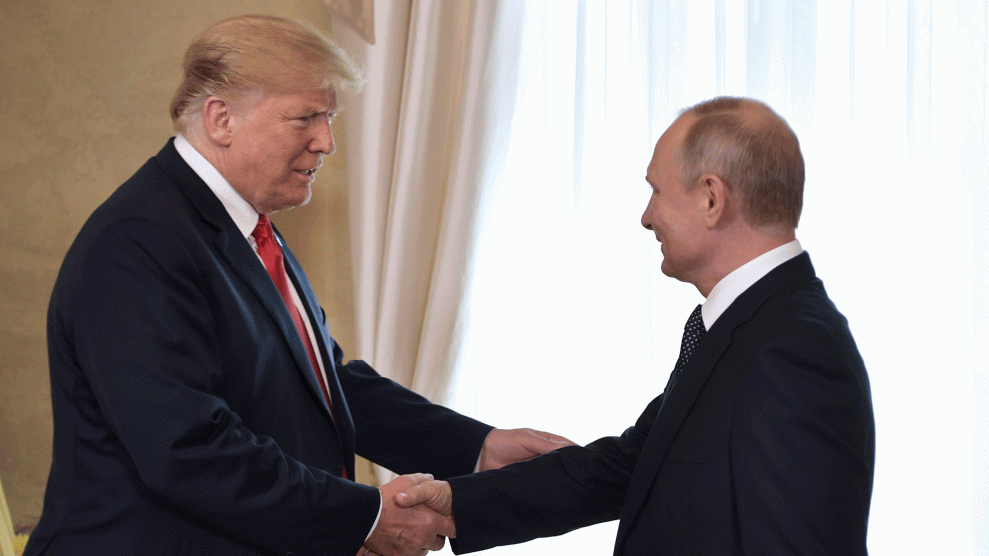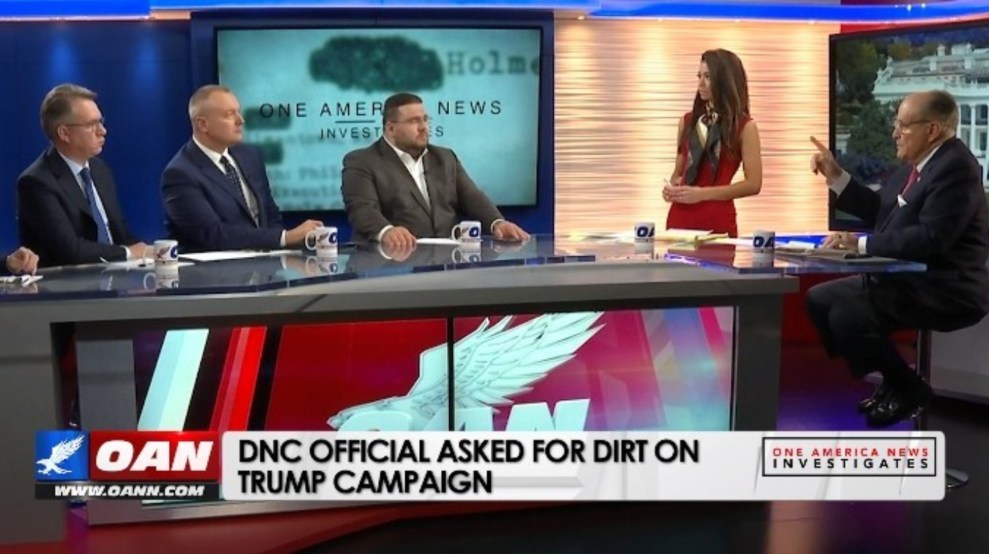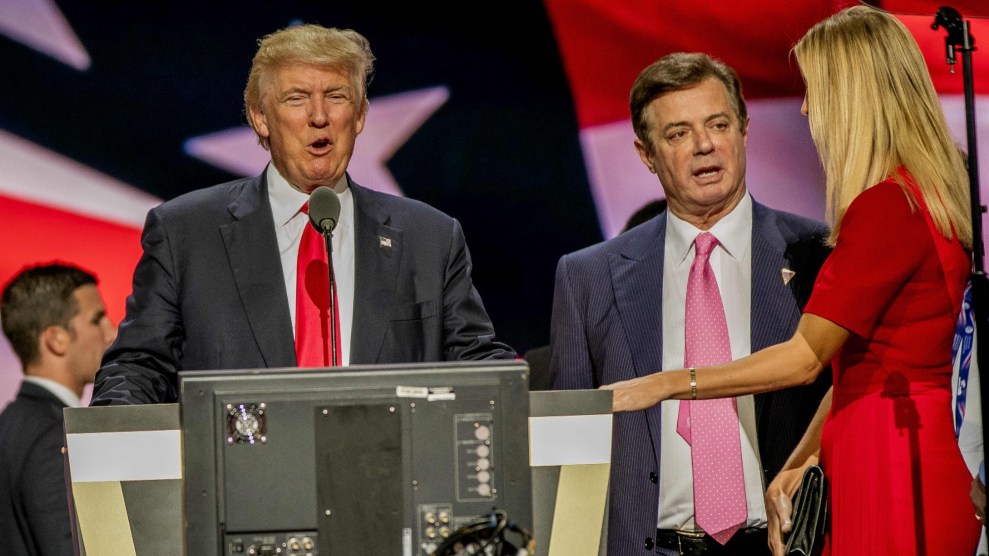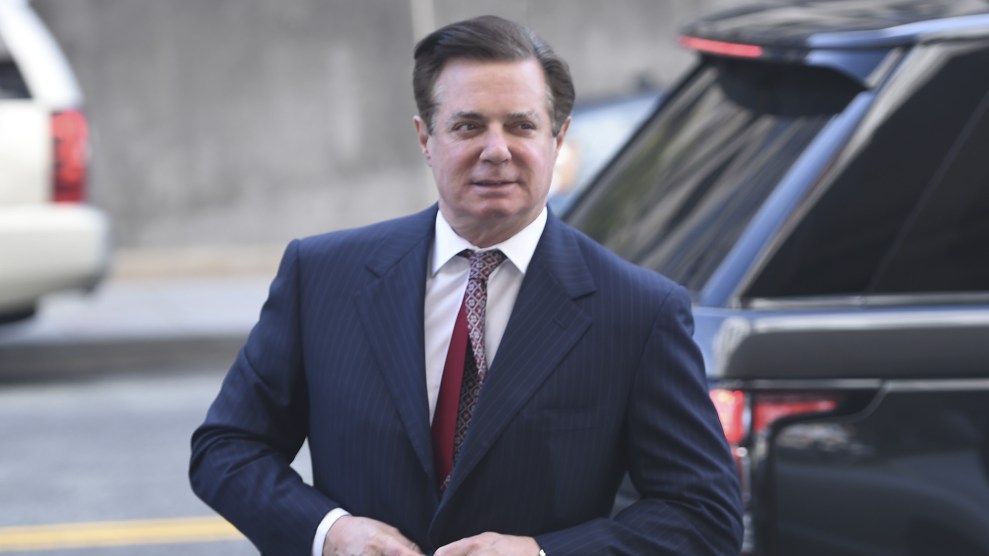
Alexei Nikolsky/AP
Donald Trump has betrayed the United States at least four times. He downplayed and failed to adequately respond to a pandemic that has killed hundreds of thousands of Americans and wreaked economic havoc for tens of millions. He mounted an extensive disinformation campaign to subvert the 2020 election, seeking to weaken American democracy and overturn the legitimate results. He did nothing while murderous insurrectionists attacked the US Capitol—he reportedly watched the assault with excitement—and prevented the orderly and peaceful transition of power. But his first great betrayal—the one that made the others possible—was Russia.
To the dying days of his presidency, Trump has insisted Russiagate was all a hoax. And in a cult-like fashion, the Republican Party has loudly and fervently echoed his denials and phony counter-accusations. When Trump, in one of his last acts as president, awarded Rep. Jim Jordan (R-Ohio), Trump’s pit-bull defender, the Presidential Medal of Freedom, the White House cited Jordan’s effort to “unmask the Russia hoax.” But the facts are quite clear—this was no hoax—and they are worth reviewing and remembering, as the first president who helped a foreign power attack the United States leaves office.
Here are the indisputable basics. Russian leader Vladimir Putin ordered a covert assault, employing information warfare, on the 2016 US election. A 2017 report of the intelligence community, the 2019 report of Special Counsel Robert Mueller, a 2018 House Intelligence Committee report, and a 2020 Senate Intelligence Committee report all stated that. The attack was real. Each of these reports—with the exception of the one from the House Intelligence Committee, which was written by highly partisan GOP allies of Trump—note that one critical aim of the Russian operation was to elect Trump. And it is certainly obvious that Moscow’s hack-and-leak covert action, which released stolen Democratic emails and documents, hurt Hillary Clinton’s campaign and boosted Trump, particularly when it started disseminating pilfered material hours after the emergence of the Access Hollywood video that showed Trump boasting that he grabbed women “by the pussy.” (The weaponized leaking of these Democratic records continued through the final four weeks of the campaign.)
So there’s one big incontrovertible fact: Trump won the presidency with Russian assistance. Ands another: Trump and his lieutenants aided and abetted Putin’s attack on the United States.
For years, Trump and his minions have strived to define the main issue of the scandal as collusion: was there evidence that he or his campaign directly conspired with Moscow’s clandestine project to torpedo the American election? Trump contended there was no joint plotting and, thus, the whole scandal was a scam perpetuated by his diabolical political enemies, including the Deep State, the Democratic Party, and the media. His defenders in the conservative world, the rightwing press, and Congress pushed this point hard. And they (falsely) claimed as slam-dunk evidence the Mueller probe’s conclusion that it had not uncovered evidence of a criminal conspiracy between Trump and the Russians, misrepresenting this finding as a declaration there had been no collusion.
Trump largely succeeded with his no-collusion defense. Indeed, no smoking gun evidence showing him scheming directly with Russians materialized. But even so, there was, at a minimum, overwhelming evidence of attempted collusion. On June 9, 2016, Donald Trump Jr., Paul Manafort, then the Trump campaign chief, and Jared Kushner held a secret meeting in Trump Tower with a Russian emissary, whom they were told was bringing them Clinton dirt as part of a secret Kremlin effort to help Trump. Ultimately, the information she shared wasn’t of much use, and there is no indication much came of this meeting. But this get-together—which didn’t become known to the public until after the election—showed that the Trump gang was made aware of Moscow’s desire to covertly assist Trump and that it was willing to conspire with Putin. At the time, the meeting signaled to Moscow that the Trump campaign would look kindly upon covert Kremlin intervention in the 2016 election. This was encouragement.
Moreover, as multiple reports have pointed out, Manafort, throughout the election, was in secret contact with Konstantin Kilimnik, a former business colleague, and shared with him inside polling data from the Trump campaign. Mueller characterized Kilimnik as an “associate” of Russian intelligence. And the Senate Intelligence Committee report—which was approved by the Republican members of the committee—described Kilimnik as a “Russian intelligence officer.” The committee put it bluntly: “Kilimnik likely served as a channel to Manafort for Russian intelligence services.” It also noted that Manafort had directly and indirectly communicated with Russian oligarch Oleg Deripaska and several pro-Russian oligarchs in Ukraine.
This is a headline that has not gotten the attention it deserved: Trump’s top campaign aide was in touch with a Russian intelligence officer, while Moscow was attacking the United States. It gets worse. The Senate report stated, “The Committee obtained some information suggesting Kilimnik may have been connected to the [Russian intelligence’s] hack and leak operation targeting the 2016 U.S. election.” Yes, according to this GOP-endorsed report, Trump’s campaign manager was in close contact with a Russian intelligence officer possibly tied to Putin’s clandestine assault on the 2016 campaign to help elect Trump. That’s a tremendous scandal in of itself. The report also revealed that the committee found “two pieces of information” that “raise the possibility” that Manafort himself was connected “to the hack-and-leak operations.” The report’s discussion of that particular information, though, was redacted. The report additionally noted that Manafort explored using his access to Trump to help advance Russian interests by promoting a pro-Russia “peace plan” for Ukraine that would allow Russia to control eastern Ukraine. This Senate investigation—which took years to complete—strongly suggested attempted, if not actual, collusion beyond the Trump Tower meeting. It indicated that the full Russia story still remains unknown.
After the election, the public also learned that Trump had engaged in his own direct act of attempted Russian collaboration: During the campaign, Trump—though he publicly asserted he had nothing to do with Russia—had been secretly negotiating a tower deal in Moscow that could have earned him hundreds of millions of dollars, and his company had sought help for this project from Putin’s office. Trump had covered-up his private Russian dealings while running for president.
But there was much more to the Trump-Russia scandal than the question of collusion. Whether or not Trump and his crew worked directly with Russian operatives, they assisted the operation by denying its existence. This is where Trump betrayed the nation in full public light. Throughout the campaign, he and his aides publicly declared that the Russian attack was not happening. Manafort, Trump Jr., and others dismissed talk of Moscow’s interference as poppycock. In his debates with Clinton, Trump mocked accusations of Russian intervention. Roger Stone, a longtime Trump lieutenant, repeatedly asserted Russia had nothing to do with the hack-and-leak operation targeting the Democrats, and he amplified the cover story created by Putin’s operatives that the hack had been orchestrated by a Romanian hacker. Yet at the same time, Trump was trying to use Stone as a conduit to get inside information from WikiLeaks on what Russia-swiped goods it had on Clinton and when they would be released—an action that Trump, according to the Senate Intelligence Committee, essentially lied about to Mueller. (Stone was subsequently found guilty of lying to investigators about his interactions with WikiLeaks—apparently covering up Trump’s role in this—and was sentenced to 40 months. In December, Trump pardoned Stone, Manafort, and other Russiagate figures.)
Trump and his henchmen were providing cover for Putin’s operation. Here was how the Senate report summed it up: “The Trump Campaign publicly undermined the attribution of the hack-and-leak campaign to Russia and was indifferent to whether it and WikiLeaks were furthering a Russian election interference effort… The Campaign was aware of the extensive media reporting and other private sector attribution of the hack to Russian actors prior to that point.” The GOP-led committee concluded that Trump, Manafort, and others aided the Russian assault by dismissing its existence. And there was that famous moment in July 2016 when Trump encouraged Russia to hack Clinton’s email. According to Mueller, Russian hackers hours later tried to do just that.
Lost in the shouting over collusion has been the fundamental point that Trump helped an enemy of the United States pull off an attack because that assault was beneficial for him. Call it treason, call it treachery, it was a foul deed. And Trump’s skulduggery worked. The Russian operation continued through the campaign, and Trump gained from it.
Trump’s denials of this attack were perhaps the first sign of how he would lead the Republicans into the perilous territory of alternative reality. Because Trump, the GOP presidential nominee, was insisting there was no Kremlin operation, Republican Senate Majority Leader Mitch McConnell got in line. He refused President Barack Obama’s request to join the White House in issuing a bipartisan response to Putin’s assault. McConnell sided with party—that is, Trump—over country. Consequently, the Russia attack became a highly partisan matter, and the United States response was undermined. In this hyper-politicized environment, the Clinton campaign’s warnings about Russian intervention were largely disregarded. Trump was able reap the reward of Putin’s operation without paying a price for assisting an enemy.
With Putin’s operatives on Trump’s side—and Trump echoing Putin’s we-didn’t-do-it cover story—Trump won the election. Afterward, he continued to have Putin’s back. He ceaselessly railed about the Russia “hoax” and the investigations underway. Enraged about the FBI’s ongoing probe, he fired its director, James Comey. In a May 2017 Oval Office meeting, Trump yukked it up with Russian foreign minister Sergei Lavrov and Russian ambassador Sergey Kislyak and told them he was not concerned about Moscow’s attack on the 2016 election. In other words, thanks and carry on! (In that meeting, Trump also disclosed highly classified information to the Russians.) The following year, during a joint press conference with Putin in Helsinki, Trump shockingly said he accepted Putin’s denials of Russian intervention in the election over the conclusions of his own intelligence community. Trying to escape the Russian taint on his electoral victory, Trump never once said he would hold Moscow accountable for its brazen assault on American democracy. Meanwhile, he took numerous steps that Mueller considered possible criminal acts of obstruction of justice to thwart the Russia investigations. And as the 2020 election approached, Trump refused to address the possibility of another Russian attack and smothered discussion of this threat.
Through all of this, he and his GOP handmaids devised distractions and outlandish conspiracy theories to deflect attention from the bottom line of the Russia scandal: Moscow covertly influenced the 2016 election, and Trump abetted that attack.
Trump, the Republicans, Fox, and other rightwing disinformation pushers claimed that the Obama administration had unlawfully spied on the Trump campaign and insisted that the Russia investigation was a baseless probe concocted to block Trump from the presidency. (The Senate Intelligence Committee report noted that Manafort “represented a grave counterintelligence threat,” that the FBI and CIA were right to be alarmed by contacts between Russians and the Trump campaign, and that the bureau was justified in opening up an investigation in mid-summer 2016). Trump and his disciples obsessed over the Steele memos, which the FBI had indeed improperly used to justify a surveillance warrant for Carter Page, a former Trump campaign foreign policy adviser. But the surveillance of Page, who had made a suspicious trip to Moscow in 2016, was but one thin slice of the investigation, and, contrary to the Trumpers’ conspiracy theories, the Steele memos were not used to open the Russia investigation. And though the Steele memos’ sensational allegation about Trump and a “pee tape” was likely inaccurate, the Senate report revealed other episodes in which Russian intelligence possibly had developed kompromat—blackmail material—on Trump based on his personal conduct during trips to Russia.
During Trump’s first impeachment, House Republicans relied on the false notion that Ukraine, not Russia, had intervened in the 2016 election to defend their Dear Leader. (Trump’s effort to pressure the Ukrainian president to manufacture a phony investigation to show this—which would clear Russia—had led to that initial impeachment.) For years, Trump’s Republican loyalists, following his lead, lied about the Russia scandal and took whatever desperate measures they could cook up to miscast it as nothing but a partisan crusade to destroy Trump. They all were complicit. They all helped Putin and Trump get away with it. They all surrendered to Russia.
This was the original sin of the Trump presidency. It doesn’t get much worse than a commander-in-chief providing aid and comfort to an enemy. But that’s precisely what Trump did. And it was this betrayal that led to the others. His response to Putin’s attack demonstrated that he would place his own interests above those of the nation’s and that he would not fiercely defend the American public from threats. He has since led the United States into assorted horrors. Separating families and caging kids. Federal police attacking peaceful protestors. Cozying up to dictators. When the coronavirus pandemic struck, Trump calculated it would benefit him politically to refrain from candidly recognizing the risk and to eschew a robust response guided by public health experts. In recent months, he has done nothing to address the nightmarish surge in COVID-19 deaths, an act of profound dereliction of duty that has further jeopardized the American people. Instead, to serve his authoritarian impulses and his own narcissistic craving for power and validation, he attempted a clownish but dangerous coup to overturn the election. Hurling ridiculous conspiracy theories, Trump stoked the paranoia and anger of his followers. Insurrection and murder ensued. But democracy prevailed.
The United States does not matter to Trump. He has not cared about the dead of COVID-19. He has not cared about the protection and preservation of the nation’s democratic institutions. He only cares about Trump. This was the grand takeaway of the Russia scandal. After all, a man who would side with an overseas enemy and facilitate its attack on his own homeland could not be expected to give a damn about the national interest. Russia was a bright red warning sign. Yet the Republican Party, millions of voters, and many in the media refused to heed it. Had they done so, the United States might have been spared much suffering. Tens of thousands of Americans—maybe more—might now be alive. Certainly, the nation would not have recently witnessed a presidentially incited mob ransack its citadel of democracy.
Putin wanted Trump in the White House, for he believed that Trump would weaken the United States and the Western alliance. He was correct. As Trump vacates 1600 Pennsylvania Avenue, the wreckage is evident. The country is more divided, its economy battered, with thousands of Americans perishing each day in an intensifying pandemic. Killer brownshirts are on the loose. Bigotry, hate, and violence have been unleashed. Democratic norms and norms of decency have been trampled, with tens of millions cheering this on. And it all began with Russia. Trump was a Russian weapon—made in the USA—aimed at America. This was no secret weapon; the danger Trump posed was always clear and present. The great tragedy is that this attack succeeded—probably far beyond the imagination of anyone within the Kremlin—because America allowed it to.













